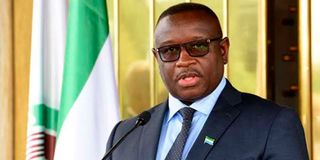Activists welcome Sierra Leone's push to legalise abortion

Sierra Leone’s President Julius Maada Bio. His Cabinet has approved a bill that seeks to end ban on abortion.
What you need to know:
- The Safe Motherhood and Reproductive Health Bill was approved now awaits the nod of the country’s lawmakers.
- If passed, it will overturn the strict ban on abortion that dates back to its colonial days.
- The current law was adopted in 1861, a century before the West African country won independence from Britain.
The announcement by the Sierra Leone government that it is lifting its more than century-old ban on abortion has received massive backing from rights groups and gender activists.
The Sierra Leone cabinet last week approved a bill that seeks to lift the ban on abortion in a bid to end the country’s high maternal mortality rate. The Safe Motherhood and Reproductive Health Bill was approved now awaits the nod of the country’s lawmakers.
If passed, it will overturn the strict ban on abortion that is contained in the current law, which was adopted in 1861 before the West African country won independence from Britain.
Safe termination
Decriminalisation of abortion would, therefore, mean women will have the right to access the information and medication they need to terminate a pregnancy safely.
Women’s rights groups have fought for years for reform of the colonial-era law as women face profound challenges in trying to access to maternal, abortion and contraceptive services.
Purposeful, a girls’ rights group in Sierra Leone, hailed the government decision, terming it a monumental step forward. “The government now must ensure the law is fully implemented, including with new guidelines on abortion provision, training for healthcare providers, procurement of abortion medication and funding,” said Rosa Bransky and Chernor Bah, its co-chief executives.
New York-based intersectional feminist group Fòs Feminista also supported the move, saying safe and legal abortion saves lives. “A major victory for women and girls, won through the tireless organising of feminist movements,” it tweeted.
Josephine Kamara, a feminist activist from Sierra Leone, termed the move a landmark moment for girls and women. “As a teenager, I nearly bled to death after backstreet abortion. Let this generation be the last to experience the horrors of what happens when women’s most basic reproductive health needs are pushed underground,” she said.
Speaking during the 10th Africa Conference on Sexual Health and Rights in Freetown, Sierra Leone President Julius Maada Bio announced his administration had unanimously approved a safe motherhood bill. He said the bill included a range of critical provisions to ensure the health and dignity of all girls and women of reproductive age.
"At a time in the world when sexual and reproductive health rights for women are either being overturned or threatened, we are proud that Sierra Leone can once again lead with progressive reform," said President Bio.
Failed attempts
Previous attempts at reform have failed, including in 2015 when MPs passed a bill that would have allowed terminations up to 12 weeks of pregnancy. The bill was blocked by then-President Ernest Bai Koroma amid pressure from religious and anti-abortion groups.
Members of the Inter-Religious Council Sierra Leone (IRCSL), who led the opposition against the bill, met with President Koroma, petitioning him against signing it into law.
One of the most vocal opponents of the Safe Abortion Bill from IRCSL was Bishop Archibald Cole, the founder of New Life Ministries International, one of the largest churches in Sierra Leone.
“We, religious leaders, work every week moulding the lives of the people spiritually and morally, and whether parliament likes it or not, we are stakeholders, we govern and influence the minds of the people by what we tell them,” Bishop Cole said at the time.
He said they were opposing the proposed law given the importance of preserving “traditional values”.
“The issues that the pro-abortionists are presenting, we consider them an abomination to our culture. Life is given by God. It is sacred. Nobody has the right to dismiss life at will,” he said.
The council was formed in 1997 during Sierra Leone’s brutal civil war, as a platform for Muslim and Christian leaders to serve as peace brokers between warring factions.
Worrying related deaths
But pro-choice campaigners have maintained that unsafe abortion accounts for up to 10 per cent of maternal deaths in the country, which had the third-highest rate of maternal fatalities in the world at 1,120 deaths per 100,000 births as of 2017.
“One in 20 women die from causes related to pregnancy or childbirth, making Sierra Leone the third-most dangerous place in the world to become pregnant."
According to a 2015 World health Organisation report, Sierra Leone had the worst maternal mortality rate in the world, and complications from unsafe abortion procedures contributed to 10 per cent of these deaths.
The latest effort to make abortion legal in Sierra-Leone comes hot on the heels of last month’s decision by the US Supreme Court that ended women’s constitutional right to abortion.
Millions of women in the US will lose the constitutional right to abortion, after the Supreme Court overturned its 50-year-old Roe v Wade decision. The judgment paves the way for individual states to ban the procedure.
Anti-abortion groups, which had pushed for the outcome for decades, applauded the decision. However, supporters of abortion rights immediately condemned the ruling, with massive protests erupting after the announcement.
Democratic-run states and cities have vowed to uphold abortion rights and welcome people from neighbouring states with bans. Some district attorneys have pledged not to prosecute people for abortion even if new laws criminalise the procedure.
In Africa, should Sierra-Leone succeed, it will join other African countries, among them Benin, Cape Verde, Democratic Republic of Congo, Mozambique, Tunisia, South Africa, and Zambia, in decriminalising abortion.





